Amadeus has dropped the word ’distribution’ in its lexicon, in favour of ‘travel channels’, and is building a new Amadeus Travel Platform to tap future growth.
It’s not just a change of name but a change in strategy in which it sees the future growth being in non-air, said senior vice president travel channels and a member of the Amadeus’ executive committee, Decius Valmorbida, interviewed in Bangkok.

The company is putting its priority on a new “fully open” platform that will pull in content other than air – ground transport, in-destination tours & activities, accommodation, LCCs or traditional airlines that do not participate in the typical GDS model, and so on – sourced from alternative means, including APIs or even direct from web through screen-scraping.
This will enable travel agents to provide their customers with a full array of options at any given moment, from the time they start establishing a relationship with a client, to when the client is buying travel, during his trip and even afer.
Said Valmorbida: “We’ve shifted our focus to the travellers, who are being exposed to travel trends, are used to shopping at high speed and want a convenient one-click buying.
“And wherever the consumers spend their time the most at, desktop or mobile, that’s where we should be. These days it need not be a browser as you know. Messaging platforms such as WeChat, Line, KakaoTalk, have become merchant platforms today.
“More and more, travel agents are telling us they want to provide customers with the full array of options at any given moment…We feel that combining GDS content with offers that are not available on the GDS but on the web would give that powerful combination to agents; that’s what the business needs.”
Valmorbida gives the example of a client who is on a seven-day trip and has filled up the first three days but not the remaining days. “Has that retailer been in contact with this client to propose a few activities in-destination that he could enjoy? Again, it’s about choices and making content available throughout the journey, not just the moment the client buys,” he said.
Albert Pozo, president of Amadeus Asia Pacific who spearheads the company’s strategy for Travel Channels and Strategic Growth Businesses including rail, hotel, travel intelligence and payments, pointed out that if agents want to deliver exhaustive content and it isn’t traditionally in the GDS, or if Amadeus does not provide that kind of integration, then agents would have to find the solution themselves.
“Typically, they look to the GDS, web, sometimes even by fax believe it or not. It’s cumbersome, it’s ineffective.
“The reality is the content is fragmented and needs to be sourced. Agents expect to have a full picture and this is what we’re trying to address,” said Pozo.
Work on the Amadeus Travel Platform started this year, for example, integrating Pyton, a Netherlands-based company it acquired in 2015, into the backend, along with the skills and know-how of its global software development centre in Bangalore. The first pilots will be done in Europe in summer.
“We’ve started with making ground transport available with a number of transfers providers, and we’ll be announcing soon new hotel providers and aggregators who will participate in the platform,” said Valmorbida.
“This is a three-year investment and we’re just at the beginning. Once the infrastructure is available, there’ll be more work and adjustments, as we see how the content is being consumed and what functionalities need to be added. We expect a decade of transformation to follow. We’re investing in a fully scalable open system – that’s not something you can do in a couple of years.”
Amadeus spends over €600 million (US$705 million) a year on technology, he said, and Amadeus Travel Platform is “the number one investment” currently.
That’s little wonder. With airlines wanting to go direct to agencies via NDC and several of them imposing a fee for bookings made through a GDS, GDSs are having to create a new vision of their future.
Valmorbida said ‘travel channels’, compared with ‘distribution’ previously, conjures a “live travel space” where players could connect, collaborate and integrate, whereas previously they were bound to one product and offering, the GDS, with agencies and airlines operating within the GDS boundaries.
“When we look at a trip spend, 40 per cent is air, 60 per cent is beyond-air and that portion is growing. So when we think about where do we see growth coming, obviously more and more we would like to expand into other areas of content which are of interest to travellers. NDC at the end of the day is an air-related initiative. When we talk of a live travel space, it’s beyond what NDC offers. NDC is a pipe; we are discussing about opening up opportunities across all the traveller journey, from planning to the end of the trip, be it expense management or sharing their experiences, so moving from air to all possible areas beyond air,” he said.
On the fact that other GDSs and non-GDS players are also looking at the space, Pozo believed Amadeus has an advantage in that it has already had a taste of integrating fragmented hotel content.
“Unlike airlines which are relatively standardised, the hotel business is a lot more fragmented. We’ve already had quite some time to develop the capability to integrate different types of content such as bedbanks. The reality now is many more players are coming in with different standards and technical capabilities, giving us quite a unique opportunity to have a platform that is open and flexible,” he said.




















